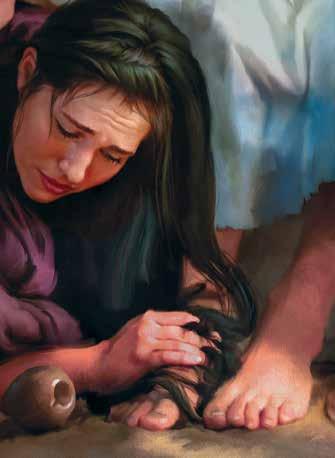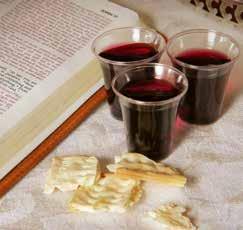
13 minute read
Ukakachira! A Story of Faith in Our Time
Joseph Kaputula (left) and brothers Christopher and Samuel Ndungyuyonga
A Story of Faith in Our Time
by Victor Kubik
Stories of amazing faith and perseverance are not limited to the Bible and Bible times. Such stories still happen, and in the most amazing places and circumstances!
How long have you waited for this moment?” My wife asked this question of a man still wet after I baptized him in a hotel swimming pool in Lusaka, Zambia. With a slight smile and self-effacing voice, he answered, “25 years.”
Joseph Kaputula and others with him from Mufumbwe, 265 miles away from Lusaka in remote northwest Zambia, tell one of the most incredible modern-day stories of faith, persistence and belief in God’s promises. Their conviction ranks with those of the heroes of faith listed in Hebrews 11. In this story that spans decades, I have found in them an inspiring and compelling example of strength in how to patiently live in a world full of overwhelming difficulties, obstacles and trials.
Jesus Christ, perhaps exasperated with people’s lack of faith, asked, “When the Son of Man comes, will He really find faith on the earth?” (Luke 18:8).
He preceded this statement with a parable about a persistent widow: “‘There was in a certain city a judge who did not fear God nor regard man. Now there was a widow in that city; and she came to him, saying, ‘Get justice for me from my adversary.’ And he would not for a while; but afterward he said within himself, ‘Though I do not fear God nor regard man, yet because this widow troubles me I will avenge her, lest by her continual coming she weary me’” (Luke 18:2-7).
What was the point of this par-able? The answer: If persistence pays off with a corrupt human being of limited power, how much more will it pay off with a just God of infinite power?
The purpose of the parable is to encourage Christians to persevere when confronted with seemingly great odds. God is listening. He will answer, act and set things right. So don’t give up!
A surprising encounter leads to life changes
This story begins in 1981 in Mufumbwe when Horasi Siyono, a mechanic, was injured in an accident. He went to the hospital and had to stay overnight. While there, he met a man reading a magazine and study guides that vividly answered from the Bible questions he had previously pondered regarding life’s purpose and Christian belief.
Horasi became interested in what he read and became a subscriber himself. As he studied, he became more and more convicted of what he was reading. In remote, impoverished Africa, the power of God’s truth was working in him. In 1982 he wrote to the address he found in the magazine and asked if he could visit somebody from the Church that published it. It was four years before he would travel to Lusaka to meet with a minister and eventually be baptized.
But the story doesn’t end here. Horasi shared his new knowledge with others in Mufumbwe. They decided to meet weekly on the biblical Sabbath day at the Chilemo Orphans Club, which one of the group’s members, Joseph Kaputula, founded and manages.
The meeting location was usually “under the mango tree” at the orphanage. This massive tree provided good shade for gatherings. They continued to study the Bible and reviewed the printed material they regularly received from the church. In 1993, however, literature and communications from the church abruptly stopped. But this did not deter them from continuing to meet weekly.
Confusing times as the truth disappeared
In 2004 Horasi reached out again and wrote to all the addresses he could find in the reading material that had been sent. This time he heard back and started receiving a new publication. But when the group read it, they noted that its teachings were now markedly different from their previous studies. What had happened? They knew right away that they did not want to pursue further contact with that church.
They had been reading the Bible on their own for nearly two decades and were fully convicted of the doctrines they learned about God the Father and Jesus Christ. They knew what the Holy Spirit was and how it worked in their lives. They understood God’s purpose in creating man. The Kingdom of God was real to them. The Word of God was transforming their lives.
By being so grounded in biblical truth, they could also readily spot what was false. They knew what they had found and believed, and no one was going to take it from them. They had already found what was portrayed in two biblical parables—the treasure hidden in the field and the pearl of great price (Matthew 13:4446). But the Church that had given them so much spiritual nourishment was apparently gone.
The Mufumbwe group had a calendar from the Church that listed the annual Holy Days of the Bible and the dates on which they should be kept. They celebrated these days faithfully, but that list of dates ended in 2008, and now they didn’t know the exact dates for future Holy Days. What were they to do?
A miraculous encounter
So, in February 2009 Joseph Kaputula decided to set out and find the Church that taught him and others the precious truths of the Bible. With only $25 in his pocket and a telephone number for Wilson Nkhoma (one of the names listed in the magazine they had), he headed for Lusaka. He found a driver going in that direction and paid him $8 for the 265-mile journey.
The driver dropped Joseph off at the Lusaka central bus station. There, Joseph repeatedly tried calling Wilson Nkhoma, but to no avail.
Now, at the bus station, a miracle occurred! God stepped in! This was more than a coincidence.
Joseph asked the gentleman sitting beside him at the bus station to watch his belongings while he went to the toilet. When Joseph returned, this man noted a study guide about salvation that Joseph was reading. Why did Joseph have it, and where did he get it? This led to a discussion about the Church.
This man sitting beside him was Jonathan Litaba. He happened to be in Lusaka at the bus station, on his way back to his home 220 miles away. Jonathan was a deacon from the Mufulira congregation of the United Church of God and was well familiar with the Church’s study guides.
In their discussion, some of the mystery of what had happened to the Church was coming clear. The Church they had received literature from initially had drastically changed its doctrines and was now something very different. Yet many who rejected this change, holding fast to prior teachings, continued as the United Church of God (now publisher of Beyond Today magazine).
Joseph then asked about Wilson Nkhoma—who, of course, Jonathan knew well. Jonathan explained that Wilson Nkhoma was now in the United Church of God as well. Jonathan told him where to go for church services in Lusaka three days hence. Certainly, Joseph would connect with all the people he needed to fulfill his mission.
Joseph always knew that the Church was still out there “somewhere.” In the meantime, Joseph went to stay with some nearby Rwandan refugees he had helped in the past.
Hope deferred yet again
On the Sabbath, Joseph went to the address Jonathan had given him. The venue was a meeting hall in military barracks. The room was arranged by a retired army officer who was now a Church member.
But when Joseph came into the barracks area, he was immediately stopped by a guard who asked him who he was and what was he was doing there. Joseph told him that he was from out of town and looking for the United Church of God and Wilson Nkhoma. The guard said he knew nothing of such a meeting in this restricted area and ushered him out of the barracks onto the street.
Joseph never made it to the 3 p.m. church service. However, Jonathan called Wilson Nkhoma to let him know about Joseph, and Wilson then called Joseph Saturday night. The two arranged to meet at Wilson’s house in Lusaka the next day.
Wilson informed Joseph more about what was happening to the Church in Zambia and elsewhere. Wilson gave Joseph lots of magazines, study guides and some money. Afterward, Joseph’s Rwandan friends helped him get on his way back to faraway Mufumbwe by giving him money for the trip, schoolbooks for his children and clothes for Joseph’s wife, Agnes. He was overwhelmed by the kindness!
When Joseph returned to Mufumbwe, he was met by his friends, sister and nephews, who were overjoyed by the success of Joseph’s mission. Joseph said that the group’s joy was tantamount to Zambia scoring a goal in the Africa Cup soccer matches where the entire nation rose in cheers! That’s how happy they were to find out that “the Church was still there.”
The end of a 25-year wait!
In Mufumbwe the group continued to meet weekly on the Sabbath as it always had since 1985, but it was now connected to the United Church of God.
In early 2010 the Mufumbwe group was invited to celebrate the biblical Feast of Tabernacles in Lusaka. Joseph and his two friends Christopher and Samuel went. These three had been waiting since 1985 to be baptized by a minister and were hoping it would happen here. Regrettably, some difficult circumstances kept that from happening then. However, they did not complain or grumble but calmly and patiently made the long return journey to Mufumbwe, never doubting that they would be baptized in due time. I was keeping the Feast that year in Lusaka, too, and it was here that I first met these men from Mufumbwe.
In the early part of 2011, they contacted Wilson Nkhoma, who told them that I would be coming to Zambia in April and that I would baptize them. That finally happened on April 24, 2011, during the biblical Feast of Unleavened Bread. This is when I first heard their astonishing and inspiring story of spiritual courage and patience. They had been all but abandoned, yet God was always with them and helped them through all the obstacles.
Since that time, they now have pastor Derrick Pringle and his wife Cherry who visit them in Mufumbwe several times each year from 200 miles east. On three occasions my wife and I have had the opportunity to travel there also. We, too, have met with them “under the mango tree” at the orphanage!
Now they have a church building and have received help for the orphanage. We have provided varied assistance for boreholes for water and have provided scholarships for some of their children, some of whom have become nurses and teachers.
Perseverance in challenging times
As we listened to Joseph tell us this story of how they had believed and prevailed, my wife asked Joseph to describe their story in one word. Joseph’s answer: “Ukakachira!” In the Kikaunde language, it means “Perseverance!”
That indeed is the perseverance of the widow in the Luke 18 parable. This is the common quality of the list of heroes in Hebrews 11 who put their absolute trust in God.
In Hebrews 11, the father of the faithful, Abraham, knew that God’s promises were as good as done. God promised him a son through whom further promises to a nation and salvation to the human race would come.
He trusted and obeyed: “By faith Abraham obeyed when he was called to go out to a place that he was to receive as an inheritance. And he went out, not knowing where he was going. By faith he went to live in the land of promise, as in a foreign land, living in tents with Isaac and Jacob, heirs with him of the same promise. For he was looking forward to the city that has foundations, whose designer and builder is God” (Hebrews 11:8-10, English Standard Version).
Abraham had to wait 25 years before his son Isaac would be born. Joseph Kaputula and the others from Mufumbwe had to wait 25 years to be baptized. But they patiently waited until the day eventually came.
In James 1:2-3 we read: “My brethren, count it all joy when you fall into various trials, knowing that the testing of your faith produces patience.” In other Bible versions the word for “patience” is translated as steadfastness, endurance or perseverance. Testing is not instant. Genuineness of character is refined in the crucible of time and sometimes pain. But in the end the result is joy, as James declares.
In Mufumbwe we see people persevering through distance, poverty, abandonment and even betrayal. But these people, similar to Abraham, always had a vision of who they were, what they had and where they were going. To them their faith was “being sure of what we hope for and certain of what we do not see” (Hebrews 11:1, New International Version).
The just shall live by faith
Faith is a way of life. In four places the Bible states that “the just shall live by faith” (Habakkuk 2:4; Romans 1:17; Galatians 3:11; Hebrews 10:27) Faith does not make things easy; it makes them possible. Ultimately it is through God’s gift of faith that we are saved: “For by grace you have been saved through faith, and that not of yourselves; it is the gift of God” (Ephesians 2:8).
My personal faith has been enlarged and enriched by the biblical accounts of the faithful. Living examples such as these in Zambia have inspired me to more seriously heed faith passages such as 2 Peter 1:5-8:
“Giving all diligence, add to your faith virtue, to virtue knowledge, to knowledge self-control, to self-control perseverance, to perseverance godliness, to godliness brotherly kindness, and to brotherly kindness love. For if these things are yours and abound, you will be neither barren nor unfruitful in the knowledge of our Lord Jesus Christ.”
May we all learn and be inspired by such examples of faith!
LEARN MORE
What is faith all about? How can you build more faith? To learn more about this vital subject, download or request our study guide You Can Have Living Faith. It explains in greater detail a subject that you will never regret understanding!







